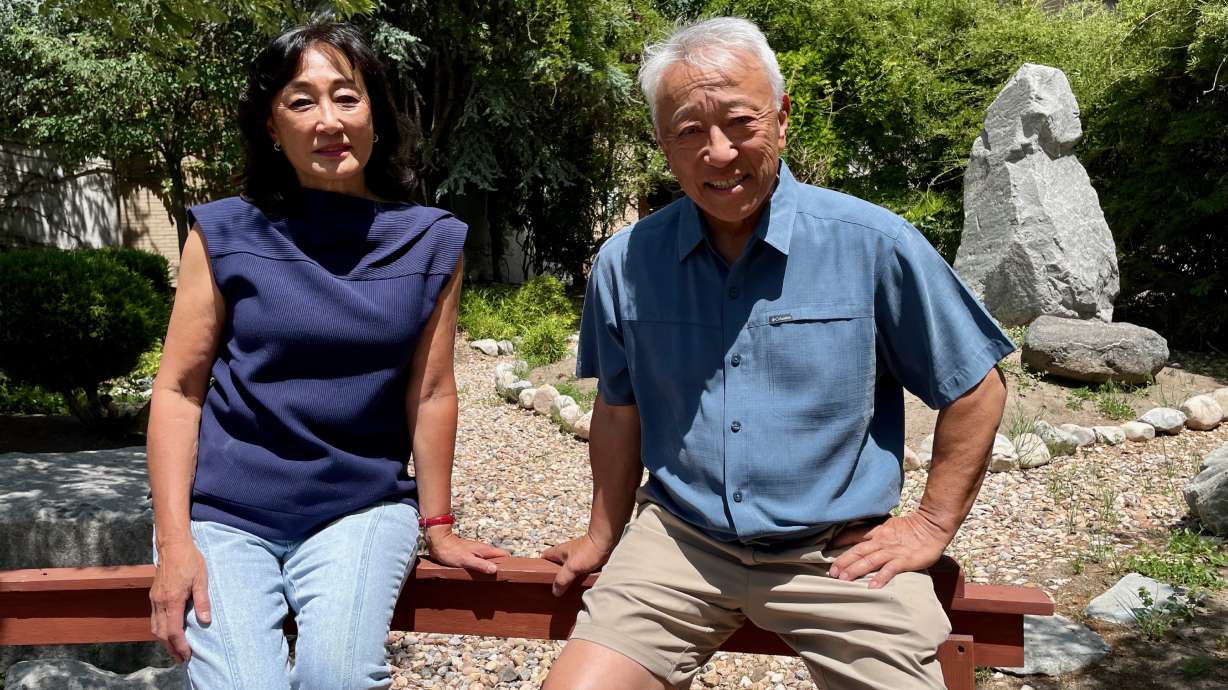Estimated read time: 4-5 minutes
- Plans to redevelop part of the land where the Salt Palace sits near Japantown are raising concerns among some.
- Advocates for the Japanese Church of Christ and Salt Lake Buddhist Temple seek protections amid the redevelopment initiative.
- Smith Entertainment Group is the main force behind the plans, encompassing an area linking the Delta Center and the Salt Palace.
SALT LAKE CITY — As city leaders and developers reimagine a core part of downtown Salt Lake City, members of the Japanese American community are watching with a measure of apprehension.
"It's their property. They can do what they want with it. But what we're looking for is some recognition that there are churches there. So our No. 1 priority is to be able to continue to hold the traditional services of churches," said Rolen Yoshinaga, a member of the board of the Salt Lake Buddhist Temple, located on 100 South, east of the Delta Center in the heart of the area to be redeveloped.
The business operators in the Japantown area — once a thriving zone along 100 South that served the area's Japanese and Japanese American community — were pushed out starting in the 1960s to accommodate Salt Palace development and expansion, according to Lynne Ward. She's a member of the Japanese Church of Christ, also located on the street.
Now, with plans progressing to redevelop a 6.5-acre swath of land between the Delta Center and the Salt Palace — adjacent to the area where the temple and her church sit — she, too, is watching with a wary eye.
It's not that the Japanese American community is being deliberately targeted, "but we happen to be in the area where they want to ... build and expand the sports district," said Ward, who has brought her concerns to the attention of local officials. "What I'm trying to say is that there's a history of mistreatment that people feel strongly about, that this is another chapter, another episode."

In a nod to Japantown's history, a segment of 100 South, where the district was centered, where the Japanese Church of Christ and the Salt Lake Buddhist Temple remain, has an honorary designation, Japantown Street. The street section east of the Delta Center and 300 West is also home to the Japanese Garden, a small landscaped area east of the Church of Christ.
Still, as Yoshinaga and Ward describe it, the area is a shadow of what it once was when scores of business operators catering to the Japanese and Japanese American community operated there after World War II.
"There were all kinds of businesses, restaurants, hotels, dry cleaner, several markets," Ward said, serving the many who moved to Salt Lake City after the war from internment camps where Japanese Americans had been held. As a child, her mom would take her there, and Ward remembers one storekeeper in particular who "would give me this little Japanese rice candy."
Maybe they can't make Japantown what it once was, but Ward and Yoshinaga want to make sure the Japanese Church of Christ and Salt Lake Buddhist Temple remain accessible during the envisioned redevelopment, which will entail demolition of part of the Salt Palace. They also want to make sure the possible uptick in visitors brought on by the transformation of the area doesn't hamper church and temple operations.
Smith Entertainment Group acquired 6.5 acres of land where part of the Salt Palace sits from Salt Lake County for $55 million in late April as part of their plans to develop a sports and entertainment district in the area. The deal is expected to be finalized in early 2027 before any drastic changes to the convention center are made.

Others, likewise, want to make sure the last vestige of the neighborhood's Japanese roots isn't wiped away completely. Clarysa Park, for one, has launched her own campaign to revitalize Japantown, to encourage Smith Entertainment Group to lure Japanese businesses, restaurants and art spaces to the area.
"This is an opportunity to bring life and vibrancy back to that portion of 100 South, and my goal is to help (Smith Entertainment Group) reimagine the possibilities of a lively Japantown," said Park, who has launched an online petition drive as part of her effort.
Preservation Utah, a nonprofit group that advocates for preservation of historic buildings, has also sounded off. "This is more than buildings — it's about identity, history and a future that honors both. As Salt Lake's Japantown clings to its last remaining landmarks — the Salt Lake Buddhist Temple and Japanese Church of Christ — the community is rallying for meaningful revitalization that reflects cultural heritage," Preservation Utah said in a Facebook post last month.

Salt Lake City Councilman Darin Mano, a Japanese American, has been vocal about protecting what's left of historic Japantown. Smith Entertainment Group has yet to secure a development agreement with the city on its plans across the street from the arena, and city leaders could press for provisions to safeguard the church and temple as the company's grand vision for the area moves toward reality.
"The development — in my view — should bring more people to those areas and make it a possibility that we redevelop a Japantown that has restaurants and shops and things like that," he said.
Separately, Salt Lake City officials have also talked about revitalizing another section of 100 South east of the Salt Palace to honor Japantown.
Contributing: Carter Williams
Read more:










